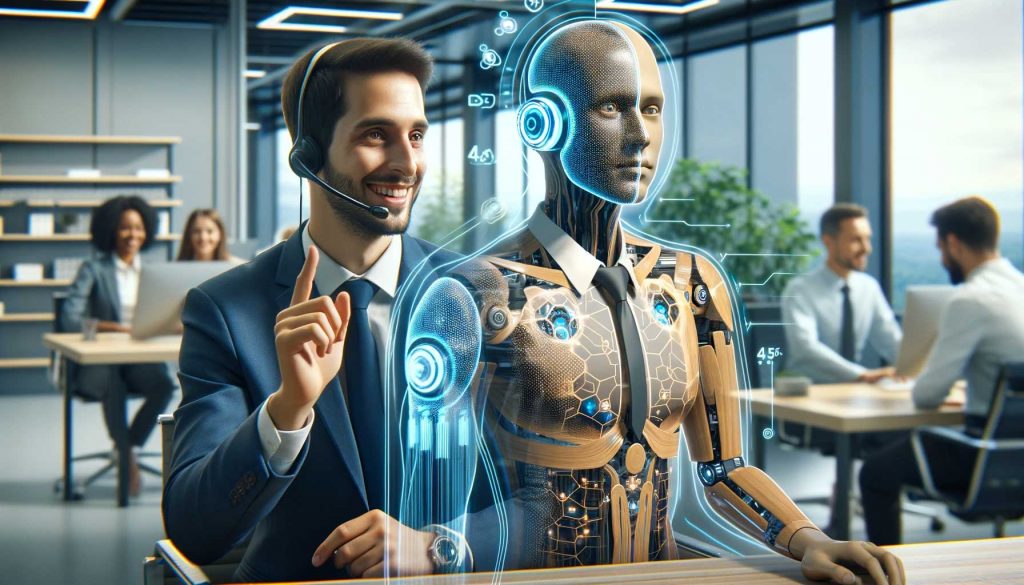Perfecting Customer Service:
Humanizing AI in CX's “Last Mile"

The Evolving Intersection of AI and Human Touch in CX
In today’s dynamic customer experience (CX) landscape, particularly in the pivotal “last mile” of service delivery, the synergy between artificial intelligence (AI) and human interaction is reshaping the industry. While this integration isn’t a new concept, it continually evolves with technological advancements and further understanding of customer behaviors, offering innovative approaches to enhance customer interactions.
Real-world examples and practical insights will guide us as we explore the evolving relationship between AI and human interaction in CX. With AI bringing efficiency and data-driven insights to the table, the human element contributes empathy and personalization, together creating a holistic approach to delivering exceptional customer service.
JetBlue’s AI Integration in Customer Service:
A Paradigm Shift
JetBlue showcases a groundbreaking shift in the airline industry when it comes to customer service operations. By partnering with ASAPP, an AI research-driven company, JetBlue has significantly boosted operational efficiency and customer satisfaction by implementing AI Operating Systems and Generative AI architectures. According to ASAPP’s founder and CEO, Gustavo Sapoznik, this partnership has substantially increased customer interaction efficiency.
These AI tools help analyze customer data and optimize service responses, ensuring faster and more effective resolutions. However, the true essence of JetBlue’s customer service lies in its crew. Their empathetic and personalized approach, seamlessly complemented by ASAPP’s AI technology, brings human warmth to customer interactions, striking a perfect balance between technological precision and the irreplaceable human element.

Miral Destinations’ AI Integration in Customer Experience: A New Frontier
Miral Destinations is redefining the hospitality and entertainment industry with its groundbreaking use of AI in customer service. Collaborating with Microsoft, Miral has harnessed the capabilities of ChatGPT through Azure OpenAI Service to elevate the customer experience at Yas Island’s theme parks and attractions. Miral reported that this innovative use of AI has successfully executed over 1,700 operations within its first week, demonstrating the effectiveness of AI in enhancing customer engagement.
This technological advancement enhances customer engagement, yet Miral’s true strength lies in its ability to blend these AI solutions with the warmth and personalization offered by its staff. The synergy between cutting-edge AI tools and human interaction sets a new standard in the hospitality industry, offering guests a unique, memorable experience that combines the efficiency of AI with genuine human hospitality.
Expanding Beyond JetBlue and Miral: AI Applications Across Industries
The impact of AI is reshaping various sectors, demonstrating its versatility beyond aviation and hospitality. In retail, companies like Rockset are transforming inventory management and customer behavior prediction with their real-time data indexing capabilities, enabling swift adaptation to consumer trends. Yet, it’s the personalized customer service that truly defines the retail experience.
In healthcare, AI tools are revolutionizing diagnostics and patient care management, but the sector’s heart remains in the compassionate care provided by medical professionals. This balance of technological efficiency and human empathy is crucial in delivering comprehensive healthcare.
The banking sector also benefits from AI, with chatbots efficiently handling routine queries. This technological assistance allows human employees to focus on complex, personalized customer interactions, highlighting the importance of the human touch in financial services.
Each of these industries illustrates the growing importance of AI in operational efficiency while underscoring the irreplaceable value of human interaction in creating fulfilling customer experiences.

Challenges of AI-Human Integration
Integrating AI into customer service presents unique challenges, primarily ensuring AI complements rather than replaces human interaction. A key concern is avoiding depersonalization, where AI’s efficiency overshadows the personal touch. McKinsey‘s research highlights the importance of a balanced AI integration, where automation is coupled with proactive, personalized customer engagement to maintain human elements in AI interactions.
Practical solutions from industry case studies offer insights. For instance, xFusion‘s use of GPT-4 in customer service illustrates AI’s role in providing 24/7 support and handling routine tasks, freeing human agents for more complex, empathetic interactions. HubSpot‘s data further supports this, showing how AI can automate manual tasks and offer real-time support to agents, enhancing their ability to respond empathetically and personally to customers.
These examples underscore that effective staff training is pivotal in achieving this delicate balance. Forward-thinking companies are adopting blended training programs that encompass technical AI tool training alongside workshops focused on empathy and customer psychology. This dual approach ensures that employees can harness AI as an enhancement tool rather than a substitute for genuine human interaction.
Preparing for the “Last Mile”: Balancing Human Capital and Empathy
Preparing for the “last mile” of customer experience, where AI meets human service, underscores the importance of training human agents to collaborate effectively with AI technologies. This comprehensive training should encompass the technical skills necessary for utilizing AI tools and the development of empathy and personalization skills.
For instance, a leading hotel chain has implemented a program where staff receive hands-on training with AI systems for guest preference analysis. Coupled with role-playing sessions to enhance their empathetic responses, this training ensures that while AI provides efficiency and data-driven insights, human agents can deliver personalized and empathetic customer service.
This holistic training model sets the stage for a seamless blend of AI efficiency with the warmth of human service, enriching customer interactions in the critical “last mile” of the customer experience journey.
The Future of CX’s “Last Mile”: A Vision for Integration
As we stand at the threshold of a new era in customer experience, particularly in its crucial “last mile,” the integration of AI with human interaction emerges as a beacon of innovation. This fusion isn’t just about leveraging technology for efficiency; it’s about reimagining how AI can amplify human empathy and understanding. The stories of JetBlue and Miral Destinations, augmented by insights from McKinsey, HubSpot, and xFusion, demonstrate a future where AI and human service don’t just coexist but synergize to elevate customer experiences.
Imagine a world where AI doesn’t just answer questions but anticipates needs, complemented by human insights that turn service into a memorable encounter. In this future, technology acts not as a silo but as a partner in enhancing the human capacity for understanding and connection. This vision is not a distant dream but an unfolding reality, where the last mile of customer service becomes a journey of discovery, empathy, and innovation.
As businesses and customer service professionals, we stand on the brink of this transformative journey. It’s a call to action to embrace AI, not as a mere tool but as a catalyst for a deeper, more human-centric approach to service. The challenge is clear: to harness the power of AI in a way that enriches, not replaces, the human touch. In doing so, we create satisfactory customer interactions and truly memorable experiences. Let this be the guiding principle as we navigate the ever-evolving landscape of customer experience in the age of AI.
Let's Chat!
Tell me how I can help you?
Got questions or ideas? Want a free consult? I’m just a click away. Reach out and let’s kickstart your success journey!
